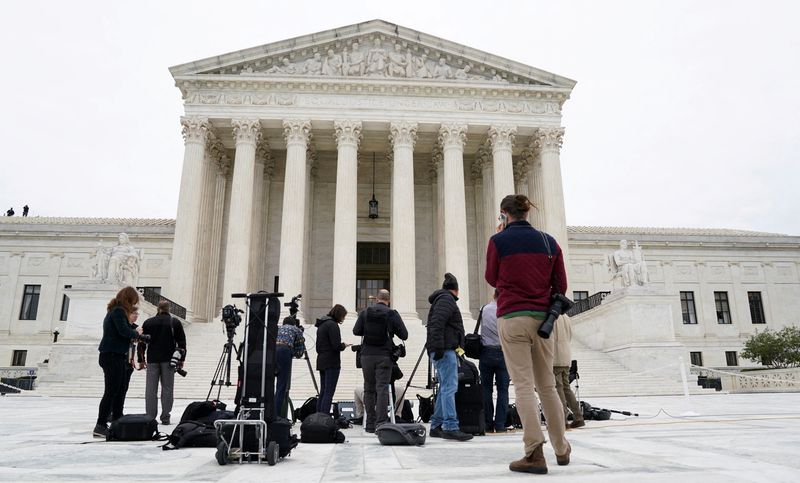By John Kruzel
WASHINGTON (Reuters) -The U.S. Supreme Court on Tuesday threw out the stalking conviction of a Colorado man who sent a barrage of unwanted messages to a female musician in a case involving constitutional free speech protections, ruling that prosecutors had not shown he understood the "threatening nature" of his words.
The 7-2 decision, authored by liberal Justice Elena Kagan, vacated a lower court's ruling that had rejected defendant Billy Counterman's claim that his messages to Denver singer-songwriter Coles Whalen were protected under the U.S. Constitution's First Amendment. Whalen said he sent thousands of disturbing and threatening messages over two years to her personal and public Facebook (NASDAQ:META) accounts, some suggesting he had seen her in public.
The First Amendment prohibits the government from enacting laws "abridging the freedom of speech," but the Supreme Court previously has held that true threats are excluded from such constitutional protection.
Kagan wrote that the First Amendment "requires proof that the defendant had some subjective understanding of the threatening nature of his statements." Justice Amy Coney Barrett, in a dissent to the ruling joined by fellow conservative Justice Clarence Thomas, wrote that the decision "unjustifiably grants true threats preferential treatment."
Counterman had a history of making violent threats to women and was on supervised release from one such federal conviction during the two years he continuously messaged Whalen. He was found guilty in a 2017 trial of stalking Whalen and sentenced to 4-1/2 years in prison as he pursued his First Amendment appeal.
Among Counterman's communications to Whalen were messages that read: "Was that you in the white Jeep?" and "You're not being good for human relations. Die. Don't need you." Others used expletives.
Counterman, citing mental illness and delusions, argued that his messages were not intended to be threatening and were thus protected speech.
John Elwood, an attorney for Counterman, hailed the court's recognition that "the First Amendment requires proof of mental state before it can imprison a person for statements that are perceived as threatening."
"Free speech is too important to imprison people for statements that are at most negligent," Elwood added.
The Colorado stalking law did not require proof of a speaker's subjective intent to intimidate. It defines stalking in part as communication that "would cause a reasonable person to suffer serious emotional distress" - known as an "objective" legal standard.
Counterman contended that prosecutors should be required to prove a speaker's specific intent to threaten before stripping offending speech of its constitutionally protected status.
The ruling did not go that far, saying prosecutors need only show that a speaker acted recklessly, meaning the person is "aware that others could regard his statements as threatening violence and delivers them anyway."
Whalen has described the messages from Counterman, which came to her starting in 2014, as life-threatening and life-altering. She never responded to Counterman during this time and blocked his Facebook account at least four times, prompting him to continue messaging her from other platforms or through new Facebook accounts he created.
Whalen said the messages eventually left her paralyzed with fear and anxiety, causing her to cancel shows and turn down career opportunities, and leading her to apply for a concealed handgun permit and sleep with a light on.
George Washington University Law School professor Mary Anne Franks, who filed a brief in the case on behalf of First Amendment scholars, lamented Tuesday's decision.
"It is deeply disappointing that the Supreme Court has chosen not only to allow stalkers to act with impunity, but to do so on the basis that stalking is free speech protected by the First Amendment," Franks said. "In doing so, they have sentenced victims of stalking to potentially lifelong sentences of terror, as well as increasing their risk of being killed by their stalkers."

Brian Hauss, a lawyer with the American Civil Liberties Union, praised the Supreme Court for affirming that "inadvertently threatening speech cannot be criminalized."
"In a world rife with misunderstandings and miscommunications, people would be chilled from speaking altogether if they could be jailed for failing to predict how their words would be received. The First Amendment provides essential breathing room for public debate by requiring the government to demonstrate that the defendant acted intentionally or recklessly," Hauss said.